On February 10, 2022, the Department of Earth Science System (DESS) and the Institute of Global Change of Tsinghua University held the "Earth System Science Forum: Nobel Prize and Climate Change Science" online, to promote the development of earth system science and inspire young students' interest in research on climate change. Also attending the forum was Academician Qin Dahe of the China Meteorological Administration, Academician Chen Deliang, August Röhss Chair Professor of Gothenburg University in Sweden, Prof. Lin Yanluan, Deputy Director of the Department of Earth Science System, Tsinghua University, Prof. Yang Zili of the State University of New York Binghamton and Researcher Zhai Panmao of the Chinese Academy of Meteorological Sciences delivered keynote speeches. Academician Xu Guanhua, former Minister of Science and Technology, Zhang Wenjian, Assistant Secretary-General of the World Meteorological Organization, and Prof. Gong Peng, Vice-President of the University of Hong Kong. The forum was presided over by Prof. Luo Yong, Dean of DESS, Tsinghua University and online participation totaled 61,000 times.
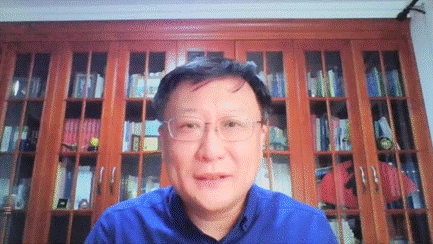
Prof. Luo Yong delivered an opening speech
Prof. Luo Yong opened his speech by extending warm welcome and heartfelt thanks to the participants on behalf of the DESS, and introduced the background of the event. He noted that the Earth System Science Forum with the theme of "Nobel Prize and Climate Change Science" was held to interpret the pioneering contributions of Nobel Prize laureates to climate change research, discuss future development directions of climate change science, and exchange insights on major breakthroughs in basic research and original innovation in China.
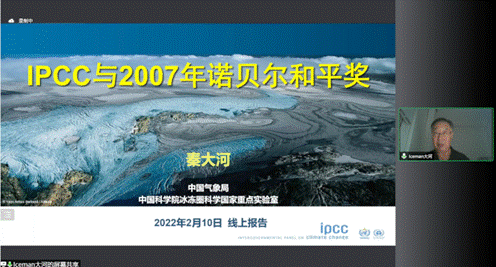
Academician Qin Dahe gave a speech
As an important participant and organizer of several assessment reports of the United Nations Intergovernmental Panel on Climate Change (IPCC), Academician Qin Dahe briefed the background and work responsibilities of the IPCC, the organization and principles of the IPCC and assessment reports, and the important roles of previous assessment reports, and reviewed the history of the IPCC winning the Nobel Peace Prize in 2007. In particular, Academician Qin noted that the government of China as a large developing country has taken the initiative to undertake the IPCC work and actively promoted the IPCC assessment process and future development. Chinese scientists have actively participated in all previous IPCC assessment reports, and the number of cited papers published by Chinese scientists in IPCC reports has been significantly increasing.
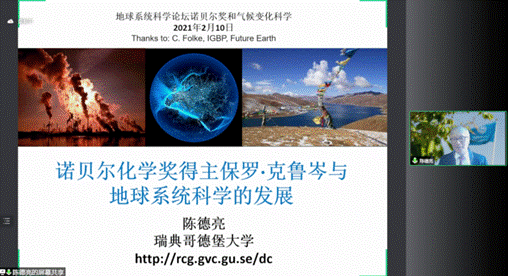
Academician Chen Deliang gave a speech
Academician Chen Deliang introduced the main academic contributions of Paul Crutzen, a meteorologist who won the Nobel Prize in Chemistry in 1995, reviewed the development of earth system science, and introduced the prospect of this discipline. According to his introduction, Paul Crutzen has not only discovered the important mechanism of stratospheric ozone destruction, but also taken the lead in putting forward the concept of "Anthropocene", and first introduced the concept of "nuclear winter", making important contributions to the development of earth system science. Academician Chen believed that the success of Paul Crutzen was inseparable from his advanced academic ideas, strong executive ability, extraordinary communication skills and active participation in international academic activities.
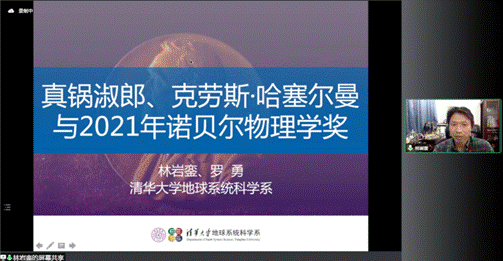
Prof. Lin Yanluan gave a speech
Prof. Lin Yanluan started his speech with an introduction to the academic contributions of the Nobel Prize winners in Physics in 2021, Syukuro Manabe and Klaus Hasselman, and talked about several challenging issues in climate science today, including the estimation of climate sensitivity, the cognition of cloud feedback under the complex action of cloud-convection-radiation, etc. He mentioned that the Earth system model is an important scientific tool in the field of climate change science, but it is also crucial to enhance the understanding of physical processes when using model simulation. Prof. Lin Yanluan encouraged young students to bravely explore the unknown and promote scientific innovation.
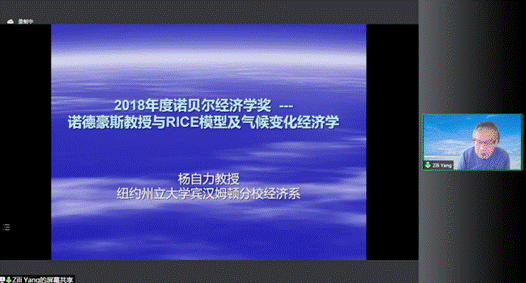
Prof. Yang Zili gave a speech
Prof. Yang Zili introduced the RICE/DICE model jointly developed with Prof. Nordhaus, the winner of the Nobel Prize in Economics in 2018. This model, which describes climate change as a negative external impact on long-term economic growth, is the most influential comprehensive assessment model of climate change in the world. Prof. Yang introduced the origin, evolution, influence and significance of the model, believing that the RICE/DICE model provided a good example of interdisciplinary research. Natural scientists, environmental engineers and economists should enhance communication, with research in different fields complementing each other to jointly promote the development of climate change research.
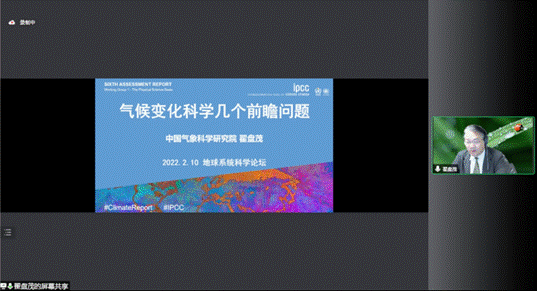
Prof. Zhai Mao gave a speech
Researcher Zhai Panmao gave a speech titled "The Prospect of Climate Change Science". He reviewed the progress in scientific cognition of climate change, observation of the earth system and development of climate models in previous IPCC assessment reports, and introduced two topics that the next IPCC assessment report would be closely concerned with, namely climate change and the city, and Short-lived Climate Forcers (SLCF).
During the exchange and discussion session, the guests answered questions from the audience and discussed the innovation of basic research in China. Participants believed that China's scientific research should be in line with international standards and closely follow the international frontier issues. Young students should learn to have fun in scientific research, dare to challenge authority and make greater contributions.
Next, the Award Ceremony for the 2021 Global Change Future Scholarship was held online. Five winners, Qin Shuqi, a doctoral candidate of the Institute of Botany, Chinese Academy of Sciences; Chen Yating, a doctoral candidate of Tsinghua University; Li Yuxuan, a doctoral candidate of Nanjing University; Wang Yichao, and Sun Xin, a doctoral candidate of Tsinghua University, made academic presentations at the meeting.
"Earth System Science Forum: Nobel Prize and Climate Change Science" is the first major academic activity held by the DESS in 2022. The Earth Science Forum is an academic exchange brand sponsored by the Department of Earth Science System, Tsinghua University, aiming to provide a platform for academic exchanges and experience sharing for researchers of earth system science, and playing an active role in promoting the rapid development of earth system science and the implementation of organized scientific research.
Written by Shi Wen, Li Juan, and Xu Meng
Edited by Wang Jiayin
Reviewed by Luo Yong and Zhang Qiang